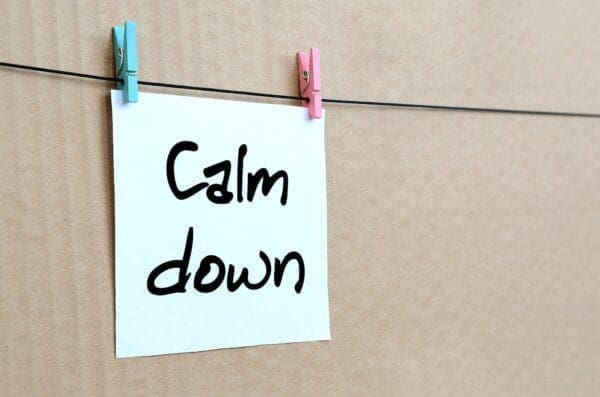‘Calm down’, ‘Chill out’, ‘Relax’
Ever had someone say this to you when you are at the height of anger?
It’s about as useful as putting a hearing aid on a tree.
You are ranting and raving about a client order that has gone wrong, a colleague that is out of order, or someone who has just driven into the side of you. And what happens next? Some idiot tells you to chill out or calm down, or the kicker of them all…’Relax’.
In the 2 million years of humans inhabiting the planet, even early cavemen found the words to respond to some numb skull who told them to calm down. Probably with a satisfying blow of his club, followed by the crowd nodding a nod of -deserved-.
All these phrases take us right back to our childhood. A parent telling their crying child that their feelings are not valid (At two years old they’re probably not!) with a ‘Calm down now, you’ll make yourself sick’. Yet, as an adult our feelings are valid. We know ourselves and the last thing we need when we are at fever pitch is some doughnut telling us that our feelings are silly, by telling us with a few choice words. In fact, it insenses most people, doing the opposite, making the situation much worse.
The Chill Out Example
I had been working with a young freelancer for some time. Accepting that he was late to our meetings, not prepared, and had a laissez-faire attitude because his work was good outside of the meetings. I had given him feedback several times calmy and gently, ensuring that I was hard on the task and soft on the person. No difference. The situation continued.
I knew the day was coming. I could feel my blood boiling with each meeting. Feeling like I was not being heard, and disrespected because his time was more valuable than mine, or so it felt. In his head, this was life, this was business and respecting people’s time was an idea that had never even featured on his ‘things to give a stuff about’. Not an excuse.

He joined our meeting 18 minutes late. I’d had enough. I flew into a rage because it was a day from hell and I was already feeling annoyed that on my to-do list was to remind him 30 minutes before the meeting to arrive on time, which I’d done. He didn’t arrive on time. He had ignored me. As I was in full flight telling him it was disrespectful to me and the other colleagues who had been waiting, he said those immortal words, ‘You need to calm down’.
How much did that help the situation?
0 %.
How much calmer did I feel after hearing that?
^^%^&&&&&^&*$&%$$£££££***((*
How much did it make the situation worse?
12,007 %.
Idiot.
To this day he has no idea why that was the wrong thing to say.
Why is Chill Out Wrong?
Whichever phrase you have chosen to say in the past; Chill out, calm down or relax, neither will work. The phrases put you in parent mode & the other person in child mode, and as a parent, you aim to control. For that reason, it won’t work. No one wants to go back to being treated like a child. That’s why we spent the last x years growing up to be an adult that can make decisions, have feelings, and most of all be heard.
Hearing those words when you are upset feels like being:
- Dismissed
- Controlled
- Condescended
- Shamed
- Invalidated

Most of the time we want to be heard. The research concludes that even when decisions are made in the business, we almost don’t mind what is decided, as long as we have been heard. This is even more so when we are angry, we want to be heard, and ‘calming us down’ attempts to limit our voice. Plus, at a time when we really, really, really need to be understood.
Suppressing Your Emotions
These phrases aim to achieve ’emotion supression’. Where we try to hide our emotions because we feel embarrassed about them. In fact, what actually happens is that it’s like trying to put a rapid bouncing ball in a small tin box, it just hits the walls of the tin box harder. Helping the person to release their bouncing rubber ball inside them is the best way forward.
This is similar to the research into the nerves we feel before a presentation and that telling ourselves to calm down or get a grip never works. We now know what to do and this brain hack is powerful. We tell ourselves that we are excited and that works because we are in a high state of arousal, so trying to get ourselves into a low state of arousal will never work. But staying with a high rate of arousal and just adjusting it from nervous to excited, works. Just tell yourself that you are ‘excited’ before a presentation instead. It works!
What Should We do Instead of Saying ‘Relax’?
What can I do to help?
Ask a question. It doesn’t necessarily need to be the question above. It could be; ‘Shall I just listen?’ or ‘What do you need from me?’. Or, instead of a question, you can make an observation. Though it can backfire depending on how upset the person is. An observation like:
It looks like you’re having a tough day.
Might be met with a positive, ‘I am. I really am…’, or could be met with, ‘You think!’.
The person wants to be heard. They want to show that their feelings are valid. They’ll calm down in their own time once they have been understood. Not disregarded with stupid phrases that invalidate them but a question that looks to know more.

In Call Centres Staff are Taught to…
Let the customer get it all out. You won’t calm down an irate customer with stupid phrases. You will only calm them down with attentive listening. ‘Please tell me what is wrong’, and ‘What else happened?’ and ‘What can I do to fix this?’. Asking questions validates the customer’s perspective. You can’t just listen – going silent – active listening is different. It’s about asking questions, paraphrasing what you’ve heard, and giving the right listening affirmations in the right places, like ‘Yep’, ‘Understood’, and ‘Ok’.
Summarising Using Chill Out
Don’t.
In the context of someone being angry, never use:
- Chill out
- Calm down
- Relax
If for some foolish reason you feel you need to use these phrases, please accept that you are putting petrol on a smouldering fire which will then very quickly look like a nuclear mushroom cloud. You will step back with surprise and wonderment at how you managed to achieve this so quickly. But, you have now been warned.
It is only permissible to use the words ‘chill out’ when you have just got that person a beer, put the TV on for them, and walked away to give them an hour to themselves!




